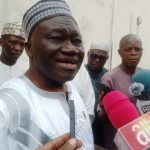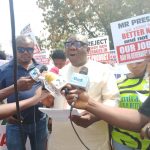( Part 3).
The APC Crisis Deepens: Vice President Kashim Shettima’s Future and the Battle for 2027.
By Bala Salihu Dawakin Kudu.
June 24, 2025
Last week proved to be one of the most tumultuous in the history of the All Progressives Congress (APC) as its North-East zonal meeting ended in an outright crisis, exposing deep fissures within Nigeria’s ruling party. The clash between prominent party leaders, particularly the sidelining of Vice President Kashim Shettima, threatens to undermine the party’s unity ahead of the crucial 2027 general elections.
Videos from the meeting showed Borno State Governor, Professor Babagana Umara Zulum, visibly frustrated with the APC National Chairman, Abdullahi Umar Ganduje, and his team. Zulum’s agitation was reportedly triggered by the perceived marginalization of Vice President Kashim Shettima. Supporters of Shettima, including influential figures like Engr. Bashir Buba Muhammad, openly accused Ganduje of attempting to “steal” the Vice Presidential slot.
In the heat of the moment, Governor Zulum reportedly declared, “No Kashim, no APC in the North,” highlighting the VP’s critical role in maintaining the party’s cohesion in the region. However, the Kano State APC chapter quickly denied claims that Ganduje was scheming to usurp Shettima’s position, underscoring a complex web of conflicting narratives within the party.
Vice President Shettima’s future within the APC is entangled in a larger political struggle. Observers note that President Bola Tinubu is strongly considering replacing Shettima as his running mate in 2027. The reasoning behind this stems largely from an escalating rivalry between the two, which many fear could tear the APC apart if left unresolved.
Tinubu’s insistence on finding a new Vice Presidential candidate is reportedly motivated by a desire to preserve party unity and prevent factional crises that could spell disaster for the APC’s dominance. Analysts warn that continued infighting could create a vacuum that opposition parties are eager to exploit.
The crisis is further complicated by allegations that the Kwankwasiyya faction, led by Senator Rabiu Musa Kwankwaso, is deliberately fomenting unrest within the APC. This group is accused of leveraging the Shettima controversy to destabilize the party for their own political gain.
Many APC loyalists view Kwankwaso’s attempts as opportunistic, especially since he and his supporters never officially joined the APC but are seen as trying to infiltrate and weaken it. The party’s core supporters argue that Kwankwaso’s ambitions threaten the stability of the APC and risk alienating grassroots members who have dedicated years to building the party.
Here’s a strong, well-structured, and informative article addressing the current political tensions within the APC, the Vice President position controversy, and the implications for the party’s future ahead of 2027. The article also touches on the roles of key political figures and groups involved.
Political maneuvering around the Vice Presidential slot is intense. Several Northern political heavyweights, including Governors Muhammad Inuwa Yahaya (Gombe), Dikko Radda (Katsina), and Deputy Senate President Barau Jibrin, have been rumored to be contenders for Shettima’s place.
While the involved governors have publicly denied these claims, insiders suggest that President Tinubu is inclined to opt for a fresh face to avoid further complications. This move signals that the decision rests solely with the president, who wields significant influence in determining his running mate.
The APC faces a critical crossroads. If the party fails to manage internal disputes prudently, it risks a repeat of the political implosion witnessed under former President Goodluck Jonathan’s administration. The current discontent, if not addressed, could trigger defections from loyalists and weaken the party’s electoral strength.
The tension between President Tinubu and Vice President Shettima, coupled with the interference from external factions like the Kwankwasiyya, could culminate in an unprecedented crisis. APC’s leadership must prioritize reconciliation and inclusivity to avoid fracturing the party ahead of the 2027 elections.
This internal turmoil also serves as a warning for those aspiring to political office or positions within the APC framework. Aligning with factional interests could either make or break political careers. It is essential for job seekers and party members to stay informed, maintain neutrality where possible, and seek roles that promote party unity rather than division.
The ongoing crisis underscores the importance of loyalty to the party’s broader goals over individual ambitions. With strategic patience and commitment, new and upcoming politicians can navigate this challenging period and secure their place within the APC.
The 2027 general elections will be a decisive moment for Nigeria’s ruling party. The fate of Vice President Kashim Shettima’s position, the influence of President Bola Tinubu, and the disruptive ambitions of the Kwankwasiyya faction collectively shape the future of APC. How the party manages these internal dynamics will determine whether it remains Nigeria’s dominant political force or succumbs to internal collapse.
The APC must heed the lessons of history, foster unity, and ensure transparent decision-making to sustain its relevance and effectiveness in Nigerian politics.
Bala Salihu Dawakin Kudu can be reach out +2348060017934.












